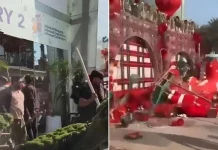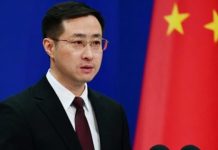— First UN Special Adviser on the Prevention of Genocide warns India
—Says Delhi must halt discriminations, abuses against minorities
—Asserts people who calls for genocide must be punished
DM MONITORING
GENEVA: Dozens of Hindu religious leaders and politicians gathered last month for a meeting in Haridwar, a prominent pilgrimage site for Hindus in the northern Uttarakhand state, where multiple speakers called on the community to arm themselves for a genocide against the Muslim minority.
“Even if just 100 of us become soldiers and kill two million of them, we will be victorious,” Sadhvi Annapurna Maa of the far-right Hindu Mahasabha (Grand Assembly of Hindus) told a cheering crowd at the event.
The videos of the meeting went viral on social media, sparking outrage and prompting calls for the arrest of those who openly called for the killings. In the month since, two speakers have been arrested while others roam free as the police say they are investigating the matter.
Meanwhile, experts have raised an alarm. During a congressional briefing in the United States, Professor Gregory Stanton, the founder of Genocide Watch, warned in unambiguous words that a “genocide could very well happen in India”.
In August last year, Stanton, who has modelled 10 Stages of Genocide, put India on the 8th stage, i.e. persecution of a community. The remaining two stages are extermination and denial.
Juan E Mendez is the first United Nations Special Adviser on Prevention of Genocide (2004-2007), appointed by then UN Secretary-General Kofi Annan. He also served as the president and commissioner of the Inter-American Commission on Human Rights and as the UN Special Rapporteur on torture. Currently, he is a professor of human rights law at the American University in Washington, DC.
Mendez has termed the situation in India, home to 200 million Muslims, “dangerous” and “deeply disturbing”. Al Jazeera spoke to him about the explicit calls for genocide against the minority and what the international community, including the UN, can do to prevent it.
How do you see calls for violence by Hindu extremist leaders in the Haridwar meeting?
Juan E Mendez: I see them with a lot of concern, especially in the context where there have been decades of hostility towards the minority communities. The calls for active violence are much more dangerous and part of the equation, and particularly in this context, it could lead to some people taking those calls seriously, acting on them, and provoking others, too.
In this case, I would look for the worse, which is noting that these speeches were made by non-state actors, i.e. people who claim to represent their ethnic group, who act as if it is protected speech and under freedom of expression, like if it was just an opinion.
After all, making calls for killing millions in any legal context is a crime, the crime of threats at the very least. And so, if there is no appropriate response to it by the government, then I think the international community needs to demand action to limit the possible effects of speech of that sort.
The US-based Genocide Watch and its founder Gregory Stanton have issued a genocide alert for India. Is India moving into a zone where the word “impending genocide” could be used?
Mendez: I think Genocide Watch is a very prestigious organisation and its opinion should be carefully considered. Stanton’s 10 Stages of Genocide is a highly respected way of anticipating and preventing genocidal crimes. The usefulness of this model is that it calls for attention to not only the fact that there are populations at risk – in this case, the Muslim minorities in India – but also to the actions that need to be taken for retardation of that situation.
The organisation does its work by not senselessly just applying a model but analysing the facts on the ground. But let me say, as a former adviser on the prevention of genocide, that I agree this sort of genocide calls and expressions are of international concern.
India ratified the Convention on the Prevention and Punishment of the Crime of Genocide in 1959 that criminalises genocide and enforces its prohibition. With many Hindu extremists who called for genocidal violence still roaming free and India’s Prime Minister Narendra Modi maintaining a conspicuous silence, is India in breach of its obligations to the Genocide Convention?
Mendez: The Genocide Convention of 1948 is about the prevention of genocide and it imposes on all states and nations the obligation that they have the power to do all that is required to prevent genocide from happening. The convention is not all explicit for specific preventive actions that are to be taken but it is understood that the government is at the first line when it comes to preventing a genocide, especially those who have ratified the convention.
So, it is the responsibility, in fact, the duty of Indian Prime Minister Narendra Modi’s government to monitor the situation and respond appropriately to such calls for violence against any of the minorities especially against the population at risk and to deploy forms of protection for them. One of them obviously is to investigate, persecute and punish those who have committed crimes under Indian law. Not doing that constitutes violations of the Genocide Convention.
Article III of the Genocide Convention makes direct and public incitement to genocide punishable. It includes constitutionally responsible rulers, public officials, or private individuals. Does the permanent International Criminal Court (ICC) have any jurisdiction over India when it comes to persecuting those who give calls for an anti-Muslim genocide?
Mendez: No, unfortunately, it doesn’t because India hasn’t signed and ratified the Rome Statute. So, what happens in the territory of India and crimes conducted by Indians abroad can only come under the jurisdiction of the ICC if they commit those acts in a state that has the ICC jurisdiction or if the UN Security Council (UNSC) decides to refer the case to ICC. For example in the case of Sudan and Libya.
Do you think that the world, especially the US, the UK, and the European countries have paid less attention to the Hindu nationalist threat to minorities in India?
Mendez: Whatever they (Hindu nationalists) have done so far should not lead anybody to any kind of complacency because, in fact, I do think the situation is dangerous. Also, some of the public policies of the Modi government are discriminatory against minorities. These breaches are in a continuum between discrimination to hate speech to violence and eventually to genocide.
The international community has the moral responsibility to protect people from this kind of harm. That is why the UN General Assembly in 2005 passed it as a convention to protect people. It is not binding on anyone but it does demonstrate the responsibility of the international community and of each member of the international community for some kind of action to protect the population at risk.




